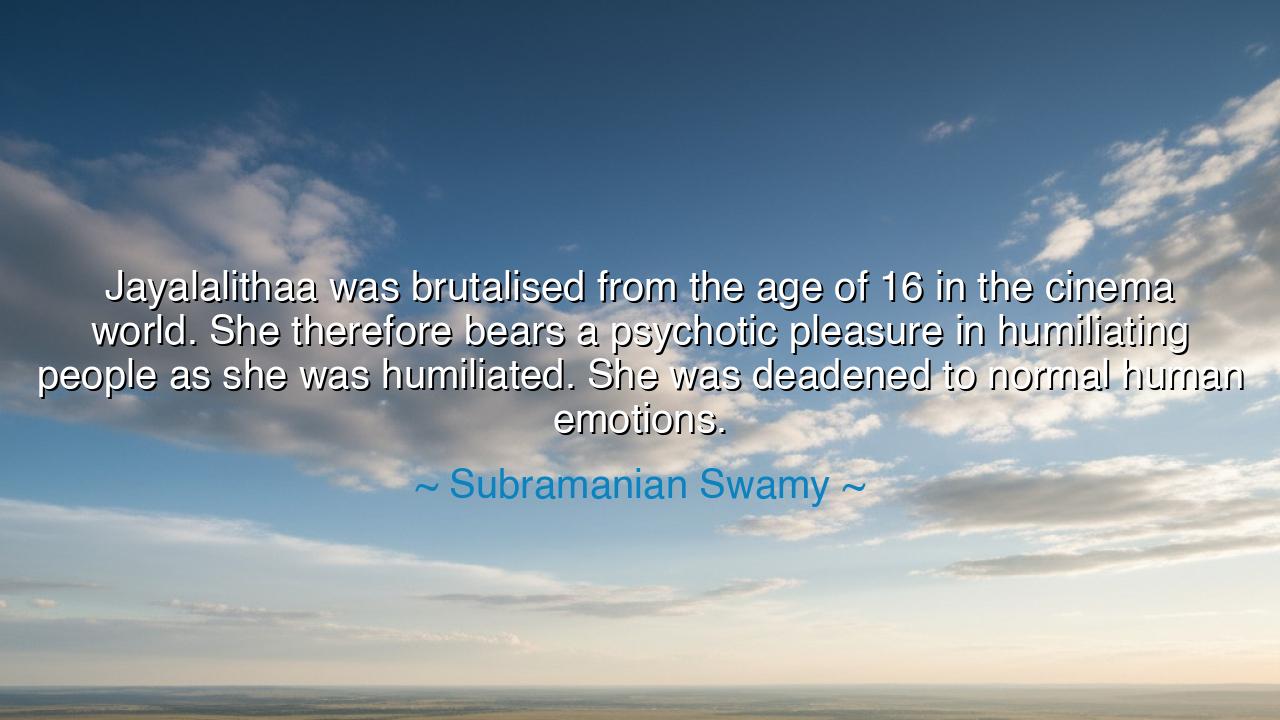
Jayalalithaa was brutalised from the age of 16 in the cinema
Jayalalithaa was brutalised from the age of 16 in the cinema world. She therefore bears a psychotic pleasure in humiliating people as she was humiliated. She was deadened to normal human emotions.






In the complex tapestry of human suffering and growth, there are those whose lives are shaped by early trauma and hardship. Subramanian Swamy, in his stark and provocative assessment, suggests, "Jayalalithaa was brutalized from the age of 16 in the cinema world. She therefore bears a psychotic pleasure in humiliating people as she was humiliated. She was deadened to normal human emotions." Swamy's words, though harsh, speak to the psychological impact of early abuse and humiliation, and the way that such wounds can shape the trajectory of a person’s life. Jayalalithaa, a political leader and former film star in India, became known not only for her power but for her seemingly cold and sometimes harsh methods of leadership. In this context, Swamy provides an explanation for her behaviors, connecting them to the early suffering she endured in the unforgiving world of cinema.
The ancients spoke often of the impact of early suffering on the soul and how such wounds could shape a person’s character. Homer’s Iliad is filled with heroes whose fates are sealed not only by their actions but by the sufferings they endure. Achilles, for example, is a figure whose anger and grief define him. Much of his rage stems from personal loss, and in his suffering, he becomes less human, less compassionate, and more driven by vengeance. His wrath becomes a psychotic force that blinds him to the deeper connections that might bring him peace. Jayalalithaa, too, might be seen through the lens of this ancient understanding: a soul who, having suffered profound early trauma, may turn inward, becoming numb to compassion and instead focusing on domination and control.
In the tragic story of Oedipus, we see how the wounds of the past can shape the choices of the future. Oedipus, though a man of great intellect and strength, is haunted by the curse of his prophesied fate. His journey is not just one of tragic discovery but of self-destruction, as his inability to see beyond his own suffering leads him to inflict suffering on others. Just as Oedipus is driven by forces outside his control, Jayalalithaa’s harshness could be viewed as a response to forces within and around her that shaped her self-image and worldview. In this sense, Swamy’s assertion suggests that Jayalalithaa, like many before her, was trapped by the cycles of trauma, unable to escape the patterns of humiliation she had endured.
Consider the life of Catherine the Great, who came to power in Russia through a combination of political cunning and personal ambition. Born to a relatively modest family, she was thrust into the harsh and competitive world of the Russian court, where she faced humiliation and manipulation. Yet, rather than allowing herself to be defined by her suffering, Catherine rose above it, not by becoming compassionate, but by using the same mechanisms of control and power that had been used against her. Like Jayalalithaa, Catherine’s rise to power involved a deep understanding of how to manipulate the forces around her. Both women, in their ways, were shaped by brutality and used that brutality to their advantage, ultimately becoming symbols of strength in their respective countries.
The lesson of Jayalalithaa’s story is not one of blind judgment but one of understanding the deep and often destructive effects of early trauma. Swamy’s words challenge us to look beyond the surface of her leadership style and to recognize the ways in which early humiliation can manifest in the behavior of a person. It speaks to the psychology of power and the ways in which insecurity, pain, and fear can be masked by an outer shell of dominance and control. But it also offers a warning: that humiliation, if left unchecked, can breed cycles of vengeance and numbness, where the very compassion we need to heal becomes unattainable.
In our own lives, Swamy’s words offer a powerful lesson on the importance of healing from the wounds of the past. We must not allow suffering to define us or to trap us in a cycle of destructive behavior. Instead, we must seek understanding and growth, learning to break free from the patterns of humiliation and pain that can shape us. Just as the ancients taught the value of self-examination and inner wisdom, we too must engage in the process of reflection and growth, choosing healing over revenge and compassion over dominance.
Thus, the lesson is clear: in the face of suffering, whether physical, emotional, or psychological, we must strive to transcend the wounds of our past, not by repressing them, but by learning to heal and transform them. Just as Achilles’s rage could have been tempered with compassion, and Catherine the Great’s brutality could have been softened with understanding, so too can we choose a path of growth rather than destruction. Let us strive, as Jayalalithaa and others have struggled to do, to break free from the chains of past humiliation, forging a future defined by wisdom, compassion, and peace.






AAdministratorAdministrator
Welcome, honored guests. Please leave a comment, we will respond soon